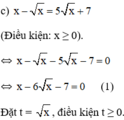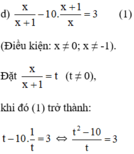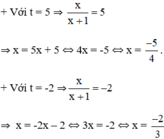giải phương trình bật nhất một ẩn
a/ 7 + 4x = 0
b/ 6 - 2x = 0
c/ - 4x + 22 = 0
câu 1 Phương trình nào sau đây là phương trình bậc nhất một ẩn
a) 0x+2=0
b) 1/2x+1=0
c) x+y=0
d) 2x+1=0
câu 1 Phương trình nào sau đây là phương trình bậc nhất một ẩn
a) 0x+2=0
b) 1/2x+1=0
c) x+y=0
d) 2x+1=0
1. giải phương trình bậc hai một ẩn
a, 3x2+7x+2=0
b,\(\dfrac{x^2}{3}+\dfrac{4x}{5}-\dfrac{1}{12}\)=0
c\(\left(5-\sqrt{2}\right).x^2-10x+5x+\sqrt{2}=0\)
d,(x-1)(x+2)=70
`a,3x^2+7x+2=0`
`<=>3x^2+6x+x+2=0`
`<=>3x(x+2)+x+2=0`
`<=>(x+2)(3x+1)=0`
`<=>x=-2\or\x=-1/3`
d) Ta có: (x-1)(x+2)=70
\(\Leftrightarrow x^2+2x-x-2-70=0\)
\(\Leftrightarrow x^2+x-72=0\)
\(\Leftrightarrow x^2+9x-8x-72=0\)
\(\Leftrightarrow x\left(x+9\right)-8\left(x+9\right)=0\)
\(\Leftrightarrow\left(x+9\right)\left(x-8\right)=0\)
\(\Leftrightarrow\left[{}\begin{matrix}x+9=0\\x-8=0\end{matrix}\right.\Leftrightarrow\left[{}\begin{matrix}x=-9\\x=8\end{matrix}\right.\)
Vậy: S={8;-9}
`d,(x+1)(x+2)=70`
`<=>x^2+3x+2=70`
`<=>x^2+3x-68=0`
`<=>(x+3/2)^2=281/4`
`<=>x=(+-\sqrt{281}-3)/2`
Giải phương trình dạng tích:
a.16-25x^2=0
b.(x+1)^2-4=0
c.(3x+1)^2-4x^2=0
d.(4x+1)-(x-2)^2=0
e.(2x+1)^2-(x+3)^2=0
\(a,\Leftrightarrow\left(4-5x\right)\left(4+5x\right)=0\Leftrightarrow\left[{}\begin{matrix}x=\dfrac{4}{5}\\x=-\dfrac{4}{5}\end{matrix}\right.\\ b,\Leftrightarrow\left(x+1-2\right)\left(x+1+2\right)=0\\ \Leftrightarrow\left(x-1\right)\left(x+3\right)=0\Leftrightarrow\left[{}\begin{matrix}x=1\\x=-3\end{matrix}\right.\\ c,\Leftrightarrow\left(3x+1-2x\right)\left(3x+1+2x\right)=0\\ \Leftrightarrow\left(x+1\right)\left(5x+1\right)=0\Leftrightarrow\left[{}\begin{matrix}x=-1\\x=-\dfrac{1}{5}\end{matrix}\right.\\ d,Sửa:\left(4x+1\right)^2-\left(x-2\right)^2=0\\ \Leftrightarrow\left(4x+1-x+2\right)\left(4x+1+x-2\right)=0\\ \Leftrightarrow\left(3x+3\right)\left(5x-1\right)=0\Leftrightarrow\left[{}\begin{matrix}x=-1\\x=\dfrac{1}{5}\end{matrix}\right.\\ e,\Leftrightarrow\left(2x+1-x-3\right)\left(2x+1+x+3\right)=0\\ \Leftrightarrow\left(x-2\right)\left(3x+4\right)=0\Leftrightarrow\left[{}\begin{matrix}x=2\\x=-\dfrac{4}{3}\end{matrix}\right.\)
Giúp vs ạ
Bài 1 giải các bất phương trình sau
a.x2 - x - 6 = 0
b.2x2 - 7x + 5 < 0
c.3x2 - 9x + 6 ≥ 0
d.2x2 - 5x + 3 < 0
Bài 2 Giải phương trình sau
A.√x2 + x + 5 = √2x2 - 4x + 1
B.√11x2 -14x - 12 = √3x2 + 4x - 7
Bài 2:
a: =>2x^2-4x+1=x^2+x+5
=>x^2-5x-4=0
=>\(x=\dfrac{5\pm\sqrt{41}}{2}\)
b: =>11x^2-14x-12=3x^2+4x-7
=>8x^2-18x-5=0
=>x=5/2 hoặc x=-1/4
giải các phương trình sau
a) x2+4x-5=0
b) x2-x-12=0
c) (2x-7)2-6(2x-7)(x-3)=0
`a,x^2 +4x-5=0`
`<=> x^2-x+5x-5=0`
`<=> x(x-1)+5(x-1)=0`
`<=>(x-1)(x+5)=0`
\(\Leftrightarrow\left[{}\begin{matrix}x-1=0\\x+5=0\end{matrix}\right.\)
\(\Leftrightarrow\left[{}\begin{matrix}x=1\\x=-5\end{matrix}\right.\)
`b, x^2 -x-12=0`
`<=> x^2 +3x-4x-12=0`
`<=>(x^2+3x)-(4x+12)=0`
`<=>x(x+3)-4(x+3)=0`
`<=>(x+3)(x-4)=0`
\(\Leftrightarrow\left[{}\begin{matrix}x+3=0\\x-4=0\end{matrix}\right.\)
\(\Leftrightarrow\left[{}\begin{matrix}x=-3\\x=4\end{matrix}\right.\)
`c, (2x-7)^2 - 6(2x-7)(x-3)=0`
`<=>(2x-7)(2x-7 -6x+18)=0`
`<=>(2x-7) ( -4x+11)=0`
\(\Leftrightarrow\left[{}\begin{matrix}2x-7=0\\-4x+11=0\end{matrix}\right.\)
\(\Leftrightarrow\left[{}\begin{matrix}2x=7\\-4x=-11\end{matrix}\right.\)
\(\Leftrightarrow\left[{}\begin{matrix}x=\dfrac{7}{2}\\x=\dfrac{11}{4}\end{matrix}\right.\)
a: =>(x+5)(x-1)=0
=>x=1 hoặc x=-5
b: =>(x-4)(x+3)=0
=>x=4 hoặc x=-3
c: =>(2x-7)(2x-7-6x+18)=0
=>(2x-7)(-4x+11)=0
=>x=11/4 hoặc x=7/2
Giải các phương trình sau:
a/ (3x – 2)(4x + 5) = 0
b/ (2,3x – 6,9)(0,1x + 2) = 0
c/ (4x + 2)(x2 + 1) = 0
d/(2x + 7)(x – 5)(5x + 1) = 0
e/ (x – 1)(2x + 7)(x2 + 2) = 0
f/ (3x + 2)(x2 – 1) = (9x2 – 4)(x + 1)
a) \(\left(3x-2\right)\left(4x+5\right)=0\)
\(\Leftrightarrow\left[{}\begin{matrix}3x-2=0\\4x+5=0\end{matrix}\right.\)
\(\Leftrightarrow\left[{}\begin{matrix}x=\dfrac{2}{3}\\x=-\dfrac{5}{4}\end{matrix}\right.\)
Vậy: \(S=\left\{\dfrac{2}{3};-\dfrac{5}{4}\right\}\)
b) \(\left(2,3x-6,9\right)\left(0,1x+2\right)=0\)
\(\Leftrightarrow\left[{}\begin{matrix}2,3x-6,9=0\\0,1x+2=0\end{matrix}\right.\)
\(\Leftrightarrow\left[{}\begin{matrix}x=3\\x=-20\end{matrix}\right.\)
c) \(\left(4x+2\right)\left(x^2+1\right)=0\)
Vì \(x^2+1\ge1>0\forall x\)
\(\Rightarrow4x+2=0\)
\(\Leftrightarrow x=-\dfrac{1}{2}\)
Vậy: \(S=\left\{-\dfrac{1}{2}\right\}\)
d) \(\left(2x+7\right)\left(x-5\right)\left(5x+1\right)=0\)
\(\Leftrightarrow\left[{}\begin{matrix}2x+7=0\\x-5=0\\5x+1=0\end{matrix}\right.\)
\(\Leftrightarrow\left[{}\begin{matrix}x=-\dfrac{7}{2}\\x=5\\x=-\dfrac{1}{5}\end{matrix}\right.\)
Vậy: \(S=\left\{-\dfrac{7}{2};5;-\dfrac{1}{5}\right\}\)
e) \(\left(x-1\right)\left(2x+7\right)\left(x^2+2\right)=0\)
Vì \(x^2+2\ge2>0\forall x\)
\(\Rightarrow\left(x-1\right)\left(2x+7\right)=0\)
\(\Leftrightarrow\left[{}\begin{matrix}x-1=0\\2x+7=0\end{matrix}\right.\)
\(\Leftrightarrow\left[{}\begin{matrix}x=1\\x=-\dfrac{7}{2}\end{matrix}\right.\)
f) \(\left(3x+2\right)\left(x^2-1\right)=\left(9x^2-4\right)\left(x+1\right)\)
\(\Leftrightarrow\left(3x+2\right)\left(x-1\right)\left(x+1\right)-\left(3x-2\right)\left(3x+2\right)\left(x+1\right)=0\)
\(\Leftrightarrow\left[\left(3x+2\right)\left(x+1\right)\right].\left(x-1-3x+2\right)=0\)
\(\Leftrightarrow\left(3x^2+5x+2\right)\left(-2x+1\right)=0\)
\(\Leftrightarrow\left(3x^2+3x+2x+2\right)\left(-2x+1\right)=0\)
\(\Leftrightarrow\left[3x\left(x+1\right)+2\left(x+1\right)\right]\left(-2x+1\right)=0\)
\(\Leftrightarrow\left(x+1\right)\left(3x+2\right)\left(-2x+1\right)=0\)
\(\Leftrightarrow\left[{}\begin{matrix}x+1=0\\3x+2=0\\-2x+1=0\end{matrix}\right.\)
\(\Leftrightarrow\left[{}\begin{matrix}x=-1\\x=-\dfrac{2}{3}\\x=\dfrac{1}{2}\end{matrix}\right.\)
Vậy: \(S=\left\{-1;-\dfrac{2}{3};\dfrac{1}{2}\right\}\)
Bài 7: Giải phương trình : a)( x- 2x + 3 ) ( 2x - x+6 ) =18
b) 3x3 + 6x2 –4x = 0
c) 3x2 – 5x = 0
d) – 2x2 + 8 = 0
a: \(\Leftrightarrow\left(-x+3\right)\left(x+6\right)=18\)
\(\Leftrightarrow-x^2-6x+3x+18-18=0\)
\(\Leftrightarrow-x\left(x+3\right)=0\)
=>x=0 hoặc x=-3
b: \(\Leftrightarrow x\left(3x^2+6x-4\right)=0\)
\(\Leftrightarrow\left[{}\begin{matrix}x=0\\3x^2+6x-4=0\end{matrix}\right.\Leftrightarrow\left[{}\begin{matrix}x=0\\x^2+2x-\dfrac{4}{3}=0\end{matrix}\right.\)
\(\Leftrightarrow\left[{}\begin{matrix}x=0\\\left(x+1\right)^2=\dfrac{7}{3}\end{matrix}\right.\Leftrightarrow x\in\left\{0;\dfrac{\sqrt{21}}{3}-1;\dfrac{-\sqrt{21}}{3}-1\right\}\)
c: =>x(3x-5)=0
=>x=0 hoặc x=5/3
d: =>(x-2)(x+2)=0
=>x=2 hoặc x=-2
Giải phương trình bằng cách đặt ẩn phụ:
a ) 3. x 2 + x 2 − 2 x 2 + x − 1 = 0 b ) x 2 − 4 x + 2 2 + x 2 − 4 x − 4 = 0 c ) x − x = 5 x + 7 d ) x x + 1 − 10 ⋅ x + 1 x = 3
a)
3 · x 2 + x 2 - 2 x 2 + x - 1 = 0 ( 1 )
Đặt t = x 2 + x ,
Khi đó (1) trở thành : 3 t 2 – 2 t – 1 = 0 ( 2 )
Giải (2) : Có a = 3 ; b = -2 ; c = -1
⇒ a + b + c = 0
⇒ (2) có hai nghiệm t 1 = 1 ; t 2 = c / a = - 1 / 3 .
+ Với t = 1 ⇒ x 2 + x = 1 ⇔ x 2 + x – 1 = 0 ( * )
Có a = 1; b = 1; c = -1 ⇒ Δ = 1 2 – 4 . 1 . ( - 1 ) = 5 > 0
(*) có hai nghiệm


Có a = 3; b = 3; c = 1 ⇒ Δ = 3 2 – 4 . 3 . 1 = - 3 < 0
⇒ (**) vô nghiệm.
Vậy phương trình (1) có tập nghiệm 
b)
x 2 − 4 x + 2 2 + x 2 − 4 x − 4 = 0 ⇔ x 2 − 4 x + 2 2 + x 2 − 4 x + 2 − 6 = 0 ( 1 )
Đặt x 2 – 4 x + 2 = t ,
Khi đó (1) trở thành: t 2 + t – 6 = 0 ( 2 )
Giải (2): Có a = 1; b = 1; c = -6
⇒ Δ = 1 2 – 4 . 1 . ( - 6 ) = 25 > 0
⇒ (2) có hai nghiệm

+ Với t = 2 ⇒ x 2 – 4 x + 2 = 2
⇔ x 2 – 4 x = 0
⇔ x(x – 4) = 0
⇔ x = 0 hoặc x = 4.
+ Với t = -3 ⇒ x 2 – 4 x + 2 = - 3
⇔ x2 – 4x + 5 = 0 (*)
Có a = 1; b = -4; c = 5 ⇒ Δ ’ = ( - 2 ) 2 – 1 . 5 = - 1 < 0
⇒ (*) vô nghiệm.
Vậy phương trình ban đầu có tập nghiệm S = {0; 4}.

Khi đó (1) trở thành: t 2 – 6 t – 7 = 0 ( 2 )
Giải (2): Có a = 1; b = -6; c = -7
⇒ a – b + c = 0
⇒ (2) có nghiệm t 1 = - 1 ; t 2 = - c / a = 7 .
Đối chiếu điều kiện chỉ có nghiệm t = 7 thỏa mãn.
+ Với t = 7 ⇒ √x = 7 ⇔ x = 49 (thỏa mãn).
Vậy phương trình đã cho có nghiệm x = 49.

⇔ t 2 – 10 = 3 t ⇔ t 2 – 3 t – 10 = 0 ( 2 )
Giải (2): Có a = 1; b = -3; c = -10
⇒ Δ = ( - 3 ) 2 - 4 . 1 . ( - 10 ) = 49 > 0
⇒ (2) có hai nghiệm:


Cả hai nghiệm đều thỏa mãn điều kiện xác định.
Vậy phương trình đã cho có tập nghiệm 
giải các phương trình sau:
a.(x - 1)(x + 2)= 0
b.(x -2)(x -5)=0
c.(x +3)(x -5)=0
d.(x + 1/2)(4x + 4)=0
e.(x -4)(5x -10)=0
f.(2x -1)(3x +6)=0
g.(2,3x -6,9)(0,1x -2)=0
\(a,\left(x-1\right)\left(x+2\right)=0\)
\(\Leftrightarrow\left[{}\begin{matrix}x-1=0\\x+2=0\end{matrix}\right.\)
\(\Leftrightarrow\left[{}\begin{matrix}x=1\\x=-2\end{matrix}\right.\)
\(b,\left(x-2\right)\left(x-5\right)=0\)
\(\Leftrightarrow\left[{}\begin{matrix}x-2=0\\x-5=0\end{matrix}\right.\Leftrightarrow\left[{}\begin{matrix}x=2\\x=5\end{matrix}\right.\)
\(c,\left(x+3\right)\left(x-5\right)=0\)
\(\Leftrightarrow\left[{}\begin{matrix}x+3=0\\x-5=0\end{matrix}\right.\Leftrightarrow\left[{}\begin{matrix}x=-3\\x=5\end{matrix}\right.\)
\(d,\left(x+\dfrac{1}{2}\right)\left(4x+4\right)=0\)
\(\Leftrightarrow\left[{}\begin{matrix}x+\dfrac{1}{2}=0\\4x+4=0\end{matrix}\right.\)
\(\Leftrightarrow\left[{}\begin{matrix}x+\dfrac{1}{2}=0\\4\left(x+1\right)=0\end{matrix}\right.\)
\(\Leftrightarrow\left[{}\begin{matrix}x=-\dfrac{1}{2}\\x=-1\end{matrix}\right.\)
\(e,\left(x-4\right)\left(5x-10\right)=0\)
\(\Leftrightarrow\left[{}\begin{matrix}x-4=0\\5x-10=0\end{matrix}\right.\Leftrightarrow\left[{}\begin{matrix}x=4\\x=2\end{matrix}\right.\)
\(f,\left(2x-1\right)\left(3x+6\right)=0\)
\(\Leftrightarrow\left[{}\begin{matrix}2x-1=0\\3x+6=0\end{matrix}\right.\Leftrightarrow\left[{}\begin{matrix}x=\dfrac{1}{2}\\x=-2\end{matrix}\right.\)
`a,(x-1)(x+2)=0`
\(\Leftrightarrow\left[{}\begin{matrix}x-1=0\\x+2=0\end{matrix}\right.\)
\(\Leftrightarrow\left[{}\begin{matrix}x=1\\x=-2\end{matrix}\right.\)
`b,(x -2)(x -5)=0`
\(\Leftrightarrow\left[{}\begin{matrix}x-2=0\\x-5=0\end{matrix}\right.\)
\(\Leftrightarrow\left[{}\begin{matrix}x=2\\x=5\end{matrix}\right.\)
`c,(x +3)(x -5)=0`
\(\Leftrightarrow\left[{}\begin{matrix}x+3=0\\x-5=0\end{matrix}\right.\)
\(\Leftrightarrow\left[{}\begin{matrix}x=-3\\x=5\end{matrix}\right.\)
`d,(x + 1/2)(4x + 4)=0`
\(\Leftrightarrow\left[{}\begin{matrix}x+\dfrac{1}{2}=0\\4x+4=0\end{matrix}\right.\)
\(\Leftrightarrow\left[{}\begin{matrix}x=-\dfrac{1}{2}\\4x=-4\end{matrix}\right.\)
\(\Leftrightarrow\left[{}\begin{matrix}x=-\dfrac{1}{2}\\x=-1\end{matrix}\right.\)
`e,(x -4)(5x -10)=0`
\(\Leftrightarrow\left[{}\begin{matrix}x-4=0\\5x-10=0\end{matrix}\right.\)
\(\Leftrightarrow\left[{}\begin{matrix}x=4\\5x=10\end{matrix}\right.\)
\(\Leftrightarrow\left[{}\begin{matrix}x=4\\x=2\end{matrix}\right.\)
`f,(2x -1)(3x +6)=0`
\(\Leftrightarrow\left[{}\begin{matrix}2x-1=0\\3x+6=0\end{matrix}\right.\)
\(\Leftrightarrow\left[{}\begin{matrix}2x=1\\3x=-6\end{matrix}\right.\)
\(\Leftrightarrow\left[{}\begin{matrix}x=\dfrac{1}{2}\\x=-2\end{matrix}\right.\)
`g,(2,3x -6,9)(0,1x -2)=0`
\(\Leftrightarrow\left[{}\begin{matrix}2,3x-6,9=0\\0,1x-2=0\end{matrix}\right.\)
\(\Leftrightarrow\left[{}\begin{matrix}2,3x=6,9\\0,1x=2\end{matrix}\right.\)
\(\Leftrightarrow\left[{}\begin{matrix}x=3\\x=20\end{matrix}\right.\)
a.(x - 1)(x + 2)= 0
<=> x-1=0 hoặc x+2=0
<=> x=1 hoặc x=-2
b.(x -2)(x -5)=0
<=> x-2=0 hoặc x-5=0
<=> x=2 hoặc x=5
c.(x +3)(x -5)=0
<=> x+3=0 hoặc x-5=0
<=> x=-3 hoặc x=5
d.(x + 1/2)(4x + 4)=0
<=> x+1/2=0 hoặc 4x+4=0
<=> x=-1/2 hoặc x=-1
e.(x -4)(5x -10)=0
<=> x-4=0 hoặc 5x-10=0
<=> x=4 hoặc x=2
f.(2x -1)(3x +6)=0
<=> 2x-1=0 hoặc 3x+6=0
<=> x=1/2 hoặc x=-2
g.(2,3x -6,9)(0,1x -2)=0
<=> 2,3x-6,9=0 hoặc 0,1x-2=0
<=> x=3 hoặc x=20